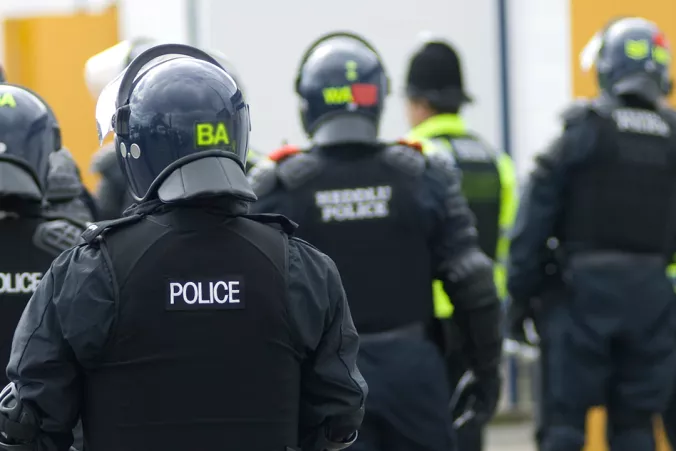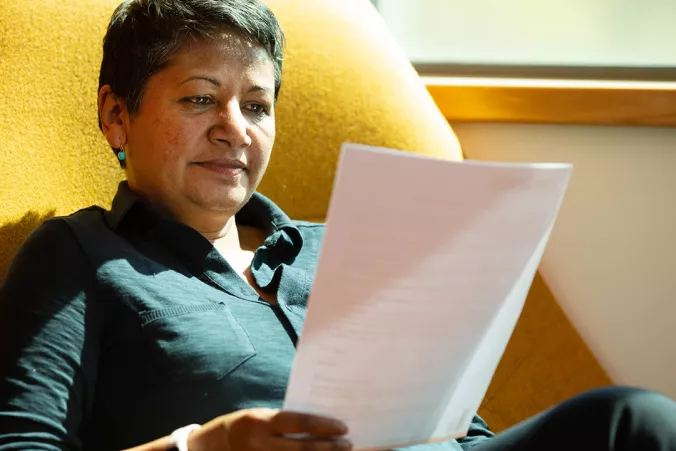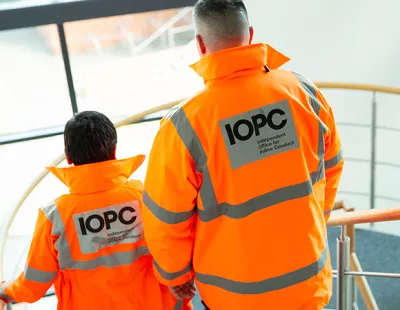Investigations
Police forces must refer the most serious incidents to us whether or not someone has made a complaint. For example, if police action results in a member of the public being seriously injured or dying:
- while in custody
- after they’ve had contact with the police
- as a result of a police shooting
- in a road collision involving the police
The police can also refer incidents to us if they have concerns about the conduct of their officers or staff. Sometimes we contact police forces directly to ask them to refer a matter to us.
In 2024/25 we received around 7,000 referrals from the police, but the majority of referrals are not investigated independently by us.
Guide to our investigations
Our remit covers all police forces within England and Wales, but also extends to:
- police and crime commissioners and their deputies
- London Mayor’s Office for Policing and Crime, and his deputy
- certain specialist police forces (including the British Transport Police, the Ministry of Defence Police and the Civil Nuclear Constabulary)
- His Majesty’s Revenue and Customs (HMRC)
- staff who carry out certain border and immigration functions who now work within the UK Border Force and the Home Office
- National Crime Agency (NCA)
- officers carrying out certain functions at the Gangmasters and Labour Abuse Authority (GLAA)
- Independent Commission for Reconciliation and Information Recovery (ICRIR)
When we receive a referral, we assess it to consider whether an investigation is necessary. No two referrals are exactly the same. All referrals are assessed on their own merit by our specialist assessment unit.
If we decide it is not necessary to investigate we may refer it back to the police force to handle in a reasonable and proportionate manner.
If we decide that it is necessary to investigate, there are three forms of investigation we can choose from:
- Local investigation: the police force's own professional standards department (PSD) investigates. The PSD are a separate department within the police force that are responsible for complaints and misconduct, counter corruption, vetting and governance
- Independent investigation: we investigate using our own investigators
- Directed investigation: we direct and control the investigation using police resources
We make difficult decisions on a daily basis about what we investigate independently versus what we ask a police force's own professional standards department to investigate.
We concentrate our work on areas where independent investigation will have most impact on maintaining public confidence in policing.
Our core work includes:
- where Article 2 (Right to life) or Article 3 (Prohibition of torture, inhuman, or degrading treatment) of the European Convention on Human Rights is engaged
- matters involving a police force's chief officers, or police and crime commissioners (where certain criteria applies as defined by our Statutory Guidance)
Our thematic work includes:
However, just because a referral contains elements of our core work or a thematic area, it does not automatically mean it will be investigated independently. We also consider the seriousness of the matter and public interest when we decide whether or not to conduct an independent investigation.
We are under a statutory duty to secure and maintain public confidence in the complaints system. Carrying out independent investigations is only part of how we achieve this. We direct some investigations and also retain a role in local complaint investigations and investigations that have involved a death or serious injury.
Our oversight, learning and improvement work also has a significant role to play and our strategy is focused on getting the balance right.
No two referrals are exactly the same. All referrals are assessed on their own merit by our specialist assessment unit.
In addition to considering whether a matter falls within one of our core or thematic areas, there are a number of potentially relevant factors that may be taken into account, including:
- the extent of the harm that may have been caused or contributed to
- the vulnerability of the complainant or affected person/s
- whether there is evidence to indicate potential wrongdoing, and the extent and nature of that potential wrong-doing
- the seniority or level of responsibility of those involved and whether the matter may involve an abuse of power
- whether those involved are still serving with the police
- significant media attention, community interest and/or tension
- the involvement of an identified issue of concern in any particular force area
- whether the matter is linked to an ongoing investigation
- the stage of any local investigation that has already been commenced
- any specialist resource considerations (this may include investigative resources and/or resources to ensure appropriate safeguarding / management of risk)
- whether grievance procedures are the more appropriate avenue for a matter to progress down
- whether alternative options are sufficient enough to secure independence, or independent oversight (for example, the involvement of an independent police force, or the right of review for us to review the conclusion of a local complaint investigation)
We may also consider:
- HMICFRS force assessments
- College of Policing Approved Professional Practice
- The relevant police force's policies and procedures
- Intelligence
- Previous learning recommendations
At the start of every investigation, we will outline which parts of the incident or event we will investigate. This is called our ‘terms of reference’.
Our investigators then gather evidence to establish all the circumstances of what’s happened. This may involve:
- taking witness statements
- interviewing police officers or members of police staff
- analysing footage from CCTV or cameras worn by police officers (body-worn video)
- obtaining other documents and records, such as telephone records
- reviewing policies that are relevant to what’s happened
- forensic analysis and independent advice from experts
At the end of our investigation, we produce a report that sets out:
- what happened
- what and how we investigated
- what evidence our investigators found
- our analysis of the evidence
We send the report to the police force. We also decide what should happen to those involved in the incident – for instance, they may need further training or they may face a misconduct meeting or a gross misconduct hearing.
The police force can then provide its representations about what should happen. While we will consider those views, we will make the final decision on what happens as a result of our investigation.
It is the police force that carries out any disciplinary action. They can hold disciplinary hearings (for gross misconduct) or meetings (for misconduct).
The possible disciplinary actions that the police force can carry out include:
- written warning
- final written warning
- reduction on rank
- dismissal without notice
The force can also take non-disciplinary actions for low-level matters of misconduct or performance, such as ‘practice requiring improvement’. Supervising officers may also offer informal advice to their staff, identify any training needs and arrange for these to be met.
If our investigations find areas for improvement or learning opportunities, we can make recommendations to the force involved – or to all forces, if appropriate.
We provide a copy of our investigation report to the relevant police force and also to:
- the person who complained or was injured
- in cases involving a death, the family of the person who died
- the Crown Prosecution Service (CPS) – but only in cases where we think a police officer or member of staff may have committed a criminal offence. The CPS will then decide whether to prosecute
- the Coroner – but only in cases where someone has died. If an inquest is to be held, it will consider our evidence
For most of the cases we investigate, we publish anonymised summaries of our reports. These set out a summary of the circumstances that prompted the investigation, the evidence gathered and our conclusions. They also explain any outcomes for those involved – for instance, what happened if there was a misconduct hearing.
We publish full investigation reports for the most serious and high-profile incidents. Reports will sometimes be redacted to remove sensitive or private information. Some reports and summaries will not be published due to the nature of the incidents investigated – for example, sexual offences.
We remove investigation reports from our website six months after they are published. Summaries remain on our site for five years. This ensures that we are complying with data protection legislation and with our publication policy.
If you cannot find the investigation you are looking for, it may be available on our National Archive website.

Find out more about our recent investigations
Information about our investigations


